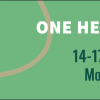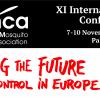
The training course on “Identification of container-inhabiting Aedes mosquitoes’ eggs was held on 30th November and gave the opportunity to 26 people to participate in four activities.
The activities organized by the University of Applied Sciences of Southern Switzerland (SUPSI) were the following:
Egg counting and egg recognition by stereomicroscope
Different supports (wooden paddle, filter paper and masonite paddle) for collecting mosquito eggs will be presented and compared to explain the advantages and disadvantages. The work done with the municipalities and few examples of different scenarios will be discussed among the group. In addition, a new tool “shiny app” which is useful for showing the seasonal trend will be shown. For the practical part of the activity, wooden paddles with eggs will be analysed with two types of stereomicroscopes (ZEISS and Motic) to see the different ways to determine Ae. albopictus, Ae. japonicus, Ae. koreicus, Ae. geniculatus and Ae. aegypti.
Egg recognition by high-resolution microscope
Using a high-resolution microscope, eggs on wooden paddles will be analysed to see different chorion structures among four mosquito species: Ae. albopictus, Ae. japonicus, Ae. koreicus, Ae. geniculatus and Ae. aegypti. A proof-of-concept for egg counting will be shown by our collaborator from SUPSI-DTI-ISEA.
MALDI-TOF Mass Spectrometry
The theory behind the MALDI-TOF mass spectrometry will be presented and there will be a practical in which plates will be prepared with single and pools of eggs of Ae. albopictus, Ae. japonicus, Ae. koreicus and Ae. aegypti to be analysed.
Molecular biology and questionnaires for egg recognition
Molecular techniques such as total DNA extraction, PCR and Sanger sequencing will be presented through images and videos, while the software MEGA will be used for cleaning and aligning sequences to compare them with BLAST database. In the second part of the activity, a questionnaire will be given in which every participant has to determine the species by looking at different egg images that show the structure of the egg chorion.
Overall, the training course was perceived very well by the participants, who suggested extending the course over several days in order to better learn certain methods of analysis and see also adult mosquitoes.



Latest News
23rd ESOVE Conference
20/01/2024XI INTERNATIONAL EMCA CONFERENCE & 4th EMCA TRAINING COURSE, PALMA, MALLORCA, SPAIN 3rd ANNOUNCEMENT
01/06/2023, Last update: 26/09/23RESULTS OF PRESIDENT ELECT ELECTIONS 2023
01/09/2023EMCA office
12 rue des Pucelles
67000 Strasbourg, France
EMCA office, c/o - Ecodevelopment SA
PO BOX 2420
57010 Filyro, Thessaloniki, Greece
(+30) 6970 975 001 office@emca-online.eu











